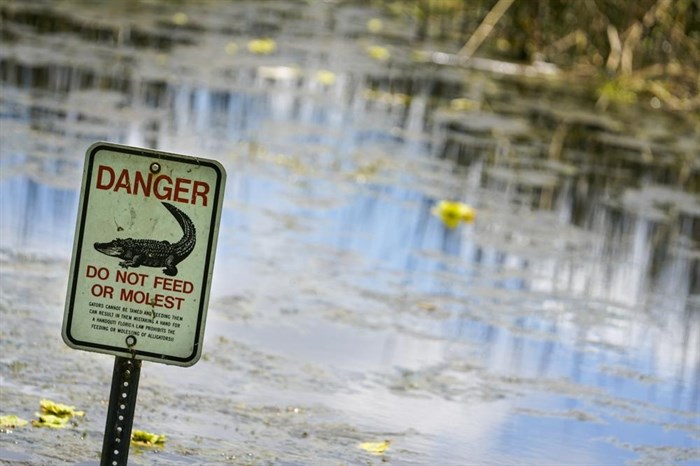
(DON THOMPSON / iNFOnews.ca)
January 15, 2024 - 12:00 PM
OPINION
Of all the things you might be thinking of in British Columbia on a freezing day in January...I’m guessing it’s not alligators. Of course, alligators don’t live in Canada…too cold…besides it’s a long walk from the Southern U.S. for such a short-legged critter.
But now is the time some Canadians head South…places like Florida to find warmer days. As a native Floridian, I’ve been around a lot of gators…and they don’t pose much danger if you follow the sound advice you’ll find here. But, first, some history and facts about gators.
Actually, Louisiana is home to more alligators than any other place in North America…about three million of them…two-thirds of them in the wild and the others farmed for meat and hides.
If you ever watched the television show, “Swamp People” you might believe most Louisiana folks spend all their days hunting for these reptiles. But unless you go looking for them in the bayous…you’re not going to see them walking the French Quarter in New Awlins.
Now Florida is a different story. There’s not a single body of water in the Sunshine State - pond, lake, river, swamp - that a gator doesn’t call home. I’ve even seen them in a roadside ditch after heavy rains.

An alligator warning sign is posted in waters near the scene where a man was found dead after going into the lake to retrieve lost disc golf discs at John S. Taylor Park, Tuesday, May 31, 2022 in Largo, Fla.
Image Credit: (Martha Asencio-Rhine/Tampa Bay Times via AP)
Gainesville - home to my alma mater the University of Florida - has more gators than any city in America. The university adopted the Gators name and mascot for good reason. Florida’s home to more than 1.3 million gators…and because of the predominantly good weather…they live everywhere.
Of the 10 lakes in North America with the largest gator populations…seven are in Florida. Lake Jesup, just north of Orlando is home to about 13,000 gators. You wouldn’t swim there…the water’s too dark and algal blooms in Summer turn huge patches of the lake into what resembles a green shag rug from the 1970s.
Gators have made an incredible comeback in my lifetime. When I was in high school in Florida…they were on the verge of extinction from over-hunting…after existing on the planet for 37 million years.
Alligators - to no one’s surprise - have a mouthful of teeth…between 74 and 80. A gator’s teeth are almost always sharp because as they dull them snapping at about everything that swims or walks near water they fall out and are replaced. An alligator can live 30 to 50 years in the wild…and will go through about 3,000 teeth.
Male gators typically reach 10 feet in length and 600 pounds, but can reach 15 feet and 1,000 pounds…a half ton. Nearly 20 years ago, I spent the longest day of my life with some local Cajuns in a bayou a couple hours west of New Orleans…pulling in nine gators, including a 750-pound 11-footer.
Gators are good athletes…they can swim faster - about 30 km/h or for you nautical types about 17 knots - and can run on land about 50 km/h for short distances. These are faster than humans can swim or run, which brings me to my first bit of real advice to Canadians travelling South.
By all means, enjoy walking among the palm trees on the shorelines of lakes and ponds, but stay 20 feet from the water’s edge, especially if you’re walking a small dog. I once saw a gator lunge 10 feet out of the water trying to nail a Chihuahua. I saw a gator in Louisiana jump six feet in the air over a line of small trees to get back into the water.
Also, never - ever - feed an alligator…it’s dangerous for you (see running speed above), and you’re conditioning the gator to see humans as a food source…endangering the next guy walking his dog by the lake. Besides in Florida, it can net you a $500 fine…which could almost buy entrance for your family to DisneyWorld.
Never, ever go for a romantic nighttime swim in a Florida lake or spring…that’s when gators are most active hunting. Shine a flashlight on any water in Florida at night and you’ll likely see a few red eyes floating on the surface of the water. They are gators…and the farther apart the eyes…the bigger the gator. Once a gator submerges…it can hold its breath 20 minutes.
The first time my wife, Bonnie, heard an alligator bellow in the wild…she was shocked. The bigger the gator the lower and louder the “growl”…which can reach 90 decibels…about the same as a clunker lawn mower going full tilt. While believed to be a territorial warning and mating notice, scientists don’t know exactly why gators bellow.
Gators are pretty well designed all things considered. An alligator’s blood serum is an extremely effective anti-viral and anti-bacterial…capable of healing a nasty gash from fighting another gator in a matter of days. And since gators don’t sort meat from bones of a prey - think raccoon or Heron - their less-than-two Ph level stomach acid dissolves bones in less than two weeks.
The truth is gators are less dangerous than you might think…there have been just 25 deaths from alligators in Florida since 1948. That means you’re at greater risk of dying in Florida from lightning, mosquitos, wild hogs, bears, rattlesnakes, water moccasins, Coral snakes, domestic terrorists, driving on I-75…well, you get the idea.
Welcome to Florida.
— Don Thompson, an American awaiting Canadian citizenship, lives in Vernon and in Florida. In a career that spans more than 40 years, Don has been a working journalist, a speechwriter and the CEO of an advertising and public relations firm. A passionate and compassionate man, he loves the written word as much as fine dinners with great wines.
We welcome your comments and opinions on our stories but play nice. We won't censor or delete comments unless they contain off-topic statements or links, unnecessary vulgarity, false facts, spam or obviously fake profiles. If you have any concerns about what you see in comments, email the editor.
News from © iNFOnews, 2024